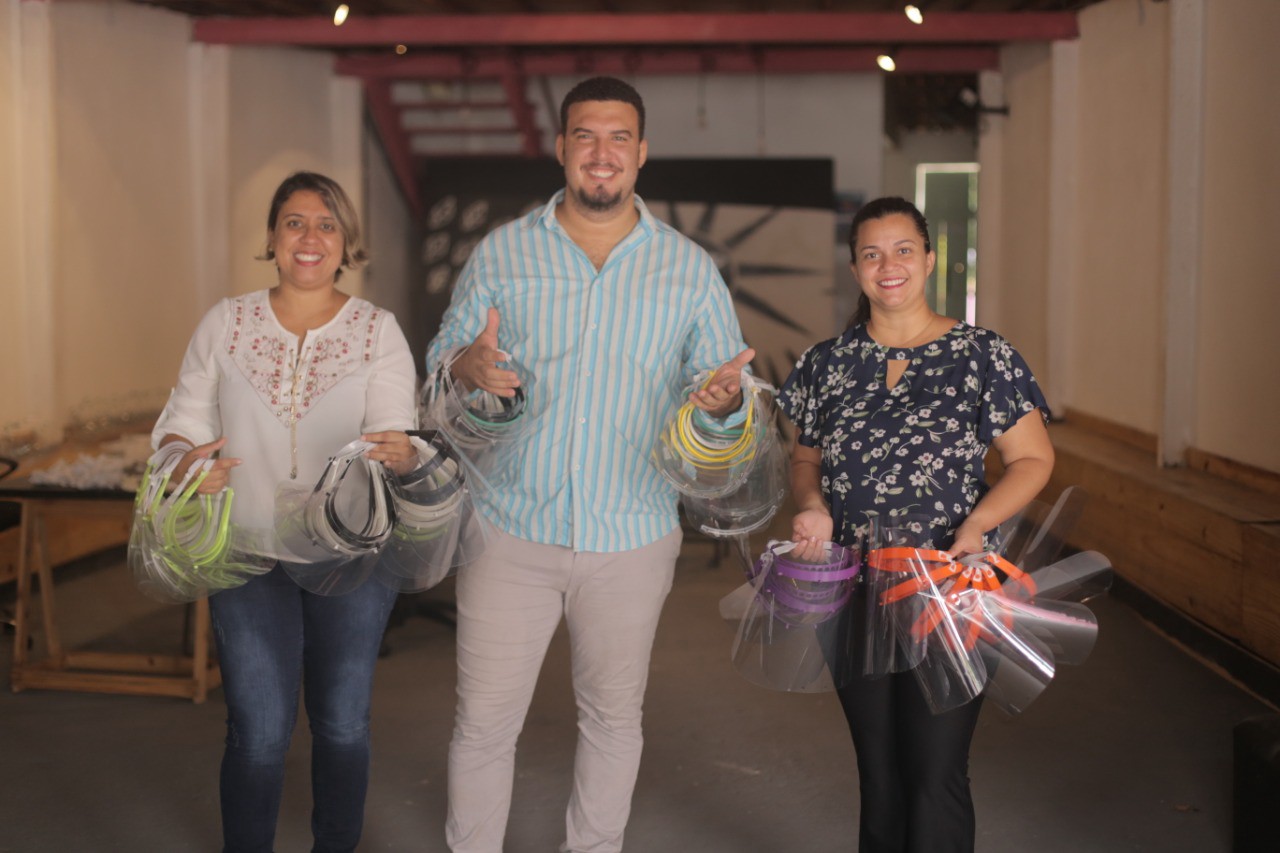Careables is an international platform collaboration that enables citizens to co-design and deliver people-centred health products through means of digital fabrication. In Latin America, partners LabCOCO, Casa Criatura and Coletivo 3D (in Olinda city) and LabProComum (city of Santos) function as the hubs to connect to local communities of citizens with (physical) healthcare needs, carers, and public healthcare professionals with the community of makers and medical herbalists.
At the beginning of March 2020, Careables Latin America focused on working with a growing health challenge, the Covid-19 crisis. Events, meetings, open-source stadiometer construction and DIY herbal pillows were left behind, and we started primary research on Covid-19 Careables products feasible to be reproduced in our reality. Much based on Thingiverse, we could select a wide range of facemasks, door openers, sterilizer, steam inhalation tubes. At some point, we shared an open document with a collection of valuable links on that moment of the coronavirus pandemic.
Since its beginning, Careables Olinda had a relevant dialogue with the Secretary of Health of Olinda. And after a meeting, we decided to tackle the problem of the lack of PPE — especially for facial protection — the city’s health system would suffer in a few days from that moment.
After a conversation on GIG Careables WhatsApp group, Alex suggested PrusaPrinters Faceshield model. We started printing the RC1 model and cutting the front acetate shields on the laser cutter. But printing things, even with eight 3D printers working 8 hours a day, took to long to the city’s health sector necessity.
After two days, Rhal developed a model to cut on the laser. It speeded up the production from 40 face shields a day to 140 a day, and most of the time now is used on assemblage (inserting EVA on the borders for comfort). We are cutting it in 4 mm crystal acrylic. It is a good weight for the head (some healthcare professionals spend 12 hours using it). In the beginning, we were cutting acetate on the laser cutter, but it is highly unsafe for humans and the machine. We then created a from shield die line shape on a vector software and produced a cardboard knife on a typographic store, and asked them to cut 1000 acetate pieces. They did it in 3 hours :).
While we were building and understanding our production line, a quite amount of people asked how to buy the face shields. Especially in the health sector community. So we started to act on two different axes: in one axe, people could donate money, and we would then donate face shields to the public health sector. We could give, until now, 50 units to Secretary of Health of Olinda, and other 27 units to 3 different hospitals. The donate face shields were PrustaPrinter’s RC1 model, with small modifications on the rubber band and on its fixation.
On the other axe, after collectively debating the issues on logistics and access to resources, we chose to decentralize distribution by also selling the face shields. With orders of a minimum of ten pieces, health sector professionals pay 6,15 EUR for each face shield. The money helps to keep the production and distribution of low budget PPEs. We are selling only the model we developed in our lab, so we will have no intellectual property prosecutions in the future. The lab is also producing Fu Face Masks, and selling it for 3 Euros each. It helps to support the ordinary citizen with some protection (the face masks have three layers of cotton fabric, with a pocket to insert a filter in between coats.)
Alongside a quicker distributing of Low Budget PPEs for the coronavirus crisis, the choice to also sell the face shields created a small economic ecosystem on the territory around the makerspaces. This ecosystem supports a group of 5 women from the same family producing, selling and distributing Face Masks. And, on the face shields production, more than ten people share the resources of a joint operation during a financial crisis. Everyone is working from their own homes or rooms, and when necessary, we are using PPEs to prevent the quicker spread of the virus.
As Gregoire points out, “social innovation is supposed to carry social transformation and to provide an alternative to the neoliberal system. Yet, because it emerges in times of crises, it instead seems to repair the dominant system’s harms, thus allowing it to perpetuate. Therefore, it is not clear whether it reinforces neoliberal capitalism, or whether it seeks alternatives to it.” (GREGOIRE, 2016, p.22). This looks very familiar with the maker movement response to the coronavirus economic and industrial crash. But, social innovation response to the crises shows us how we could support the co-work space team, foster a quicker distribution to the field of low-cost EPPs during the crisis and the co-work infrastructure maintenance during lockdown times.
We have so far produced more than 500 face shields on the laser cutter and sold it out. Plus a hundred 3D printed ones were donated to different hospitals, to the Secretary of Health of Olinda and to the Campesinos Landless Movement from Recife (they are serving food for homeless people every night, so they are also dealing with a risky situation). We are now producing from 50 to 70 face shields a day, and we plan to double production, as there are still a lot of people asking for protection. We are also searching now to develop the face shields. We are testing a new model to benchmark its weight, comfort to use, production speed and costs, and maybe get a new version as soon as possible.
1. GREGOIRE, M. Exploring various approaches of social innovation: a francophone literature review and a proposal of innovation typology. RAM. Revista de Administração Mackenzie, v. 17, n. 6, p. 45–71, 2016. ISSN 1678–6971.
Originally published on Medium.


